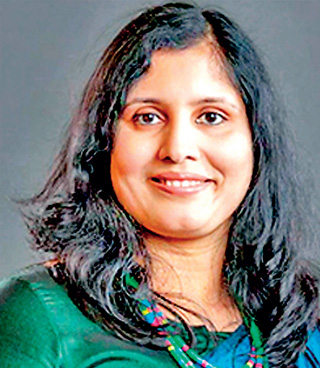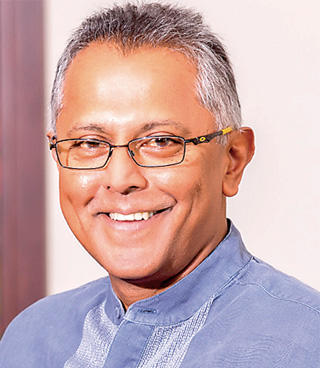Tuesday Feb 17, 2026
Tuesday Feb 17, 2026
Tuesday, 8 March 2022 02:24 - - {{hitsCtrl.values.hits}}

UN Women Regional Office for Asia and the Pacific Officer-in-Charge Sarah Knibbs

HCL Technologies Resident Director and Centre Head Thothathri Vaikuntam

A. Baur & Co. Director Finance Pavithra Samarasinghe

CBL Group Managing Director Sheamalee Wickramasingha

Jetwing Symphony Chairman Hiran Cooray

MAS Holdings Group Human Resource Director and UN Global Compact Network Sri Lanka Board Member Dinali Pieris
According to the Harvard Business Review, having women on the corporate board of companies make significant contributions that men are less likely to make, such as, broadening the discussion of the board to better represent the concerns of a wide set of stakeholders, including employees, customers, and the community at large.
Women tend to be more tenacious when exploring for solutions to challenges, and they tend to bring more collaborative approach to leadership, which improves communication among directors and between the board and management. It is recommended by the Harvard Business Review to have a minimum of three women on the board to foster better collaboration, to overcome isolation and avoid being ignored by other board members. By doing so the overall performance of the company and the board improves significantly. For women to receive board appointments, women need to be more accomplished than men to do so.
“Breaking Gender Barriers in the Boardroom” was a thematic session of the recently concluded Making Global Goals Local Business (MGGLB) Sri Lanka.
MAS Holdings Group Human Resource Director Dinali Pieris who is also a Board Member of UN Global Compact Network Sri Lanka as moderator laid the foundation of the topic, the objective being to address the starkest indicator of gender inequality the lack of voice at the highest level of decision making - The boardroom.
She spoke of the research now giving companies clear reason to have initiatives to support the efforts to bring more women into the boardroom. She posed the pertinent question of what we mean by being Board ready and if our biases on who has traditionally held these positions are holding us from the solutions. UN Women Regional Office for Asia and the Pacific the Officer-in-Charge Sarah Knibbs touched on the Importance of Gender Equality in the Boardroom to achieve SDG Five. She began with reiterating that the SDGs are really everybody’s business, and the strong participation of the private sector is critical to driving change.
Sarah spoke of the correlation between women on the board and business prosperity, mentioning that there are over 90 studies and reports by different organisations and countries which corroborate the evidence. She went on to say that apart from positively impacting financial performance, female board members bring a host of other benefits to organisations. A more gender-balanced board results in improved monitoring, better collaboration with various stakeholders and different leadership styles.
She also elaborated on the persistent barriers women face, especially the unequal distribution of the care burden. she touched on the possible solutions such as reviewing selection processes including formalising them, addressing barriers such as care work, and keeping better data on men and women’s leadership progression. CBL Group Managing Director Sheamalee Wickramasingha spoke on the importance of thought diversity at the Board level. Drawing from her experience in the manufacturing sector, she highlighted that the journey to board diversity should start much earlier, at the recruitment stage, and should be a part of recruitment strategy. For more females to join the workforce, she says organisations need to look at changing the fundamental thinking behind the way we conduct business and the way we nurture talent, to create a cultural shift. She spoke of CBL’s efforts to create and communicate opportunities within the organisation to develop talent for management succession.
HCL Technologies Resident Director and Centre Head Thothathri Vaikuntam gave an interesting take on influencing the largest shareholders in the company to advocate for gender equality drawing from his own experiences.
How an equality mindset can become an almost innate thinking if the correct behaviour is encouraged through awareness and training. And how can this be a continuous process. He spoke of his organisation investing in this capacity building very early on with management so that over 10-12 years this has translated into leadership with evolved understanding. He went on to show how this is proven by the one-year-old operations in Sri Lanka which with little effort has 60% of women, he spoke of programs in career, leadership mentorship and sponsorship that all contribute to maintaining the near organic state HCL now enjoys in gender diversity.
A. Baur & Co. Ltd. Director Finance Pavithra Samarasinghe touched on the behavioural changes required at various levels of leadership. Especially at the Board she spoke of the advantage of having tacit knowledge of the personalities and culture being an advantage in integrating to the board, the importance of leaving ego, your functional priorities behind when at the board. The need of assertive backdrop of always updating and staying abreast with the subject at hand and business acumen. Through the gender lens she spoke of women with their high EQ and natural strength in collaboration is very effective in neutralising strong opposing views and brings people together for the common good.
Jetwing Symphony PLC Chairman Hiran Cooray had some great anecdotal examples of his company culture has evolved over the years to attract more diversity unconscious bias can easily slip into decision making such as giving opportunities and how with time and understanding has now made these decisions evolve onto being based on commitment and capability.
Dinali Pieris closed this session with a metaphor of a broken rung of a ladder symbolising the barriers faced by mid-career women on the road to the board emphasising that the journey to break those barriers has begun. But much remains to be done and it is in all our interest to do so.
The Making Global Goals Local Business (MGGLB) Sri Lanka Virtual Conference was held on the 27 - 28 October 2021. The virtual conference included 10 sessions and showcased how responsible business practices can create new market opportunities and accelerate action on the UN Sustainable Development Goals (SDGs). MGGLB Sri Lanka was part of a five-year campaign to drive forward the UN Global Compact’s mission to mobilise a global movement of sustainable companies and stakeholders taking radical, ambitious and decisive actions to change our trajectory. In collaboration with the United Nations in Sri Lanka, UNDP Sri Lanka and the Sustainable Development Council of Sri Lanka, MGGLB Sri Lanka brought together local and global leaders from business, civil society, Government, Global Compact Local Networks and the United Nations to inform, inspire and catalyse collective approaches in Sri Lanka.
As a special initiative of the UN Secretary-General, the United Nations Global Compact is a call to companies everywhere to align their operations and strategies with 10 Principles in the areas of human rights, labour, environment and anti-corruption. Our ambition is to accelerate and scale the global collective impact of business by upholding the 10 Principles and delivering the Sustainable Development Goals through responsible companies and ecosystems that enable change. With more than 12,000 companies and 3,000 non-business signatories based in over 160 countries and 69 Local Networks, the UN Global Compact is the world’s largest corporate sustainability initiative — one Global Compact uniting business for a better world.